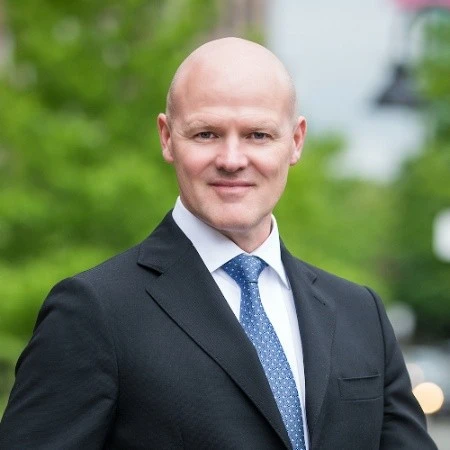How Does the Strength of Weak Ties Make You Happier?
How Does the Strength of Weak Ties Make You Happier?
Hi, I’m Paul Krismer, and I’m your happiness expert. This week’s edition is all about a different take on social relationships. I’ll start by saying this: I’m playing hockey for the first time in about 10 years, and I’m loving it. I used to play a lot of hockey, and my life just got so busy. I was traveling so much, I couldn’t really be a reliable team member, so I got into other sports. Then, eventually, my shoulder got a bit injured, and I couldn’t do some of the other things that I used to be able to do, so I rejoined hockey. Here in Las Vegas, most of the men’s hockey is drop-in, so it’s the kind of thing where you can just show up, you get split into whatever team you end up with, and you go out there and have a ball. I’m loving it. I get this great cardiovascular workout, the endorphins are pumping by the end of the game, and I’m having a very good time. But, I’m also realizing and cultivating this thing that sociologists call weak ties. They’re the social bonds that aren’t about love and deep friendship, and the people you share your life with, or share most of your moments with. They’re rather people that we kind of just encounter on almost a random basis, and they may or may not be meaningful, important people in your life. Well, my hockey teams are full of people like that, especially since it’s drop-in, I’m not even getting to see always the same people week after week or day after day. Even though I did get to go for a beer with a few guys last night, fun, super fun. Well, this video is about the importance of weak ties, and it’s more than you might initially think. It, in fact, increasingly is shown to enrich our lives. So, I’m going to give you a few ways in which that is true in the upcoming video.
As a coach, public speaker, and best-selling author, I teach topics just like this one all around the world. So, stay tuned, and I’ll give you practical tools that you can use to make both yourself and those around you both happier and more successful. You know, I’ve often emphasized the importance of social relationships in our happiness. The research is really clear: We are deeply tribal animals. That’s how we evolved as a species. We need to be connected, we need a sense of belonging, we need a sense of love and security that comes from deep and meaningful loving relationships. I often emphasize it’s not a popularity contest. One or two people who love you, and you love them, that’s enough for this deep kind of bonded love that we need to have. I’ve even sometimes, not jokingly, said, your bond with your dog, or your cat, some mammal with a similar limbic system to the one we have, is enough also to really satisfy that need for love. But, I want to emphasize in this video the research findings with respect to weak ties. This idea of people who we just encounter, not necessarily randomly, but they’re not the people who are meaningful and important in our lives. One of the really interesting findings is that weak ties increase important knowledge for us. There’s a tendency we have with the people who are closest to us that we swim in the same kind of informational pools. I have a weekly Zoom call with all of my family members, and we all think more or less the same, our politics are the same, most of the people are from the same part of the country, and we have the same conversations. So, people are talking about what’s happened with their cat for the last week, and there’s not a lot of learning going on from one another because we’re already in the same pool of knowledge that we share amongst ourselves. An interesting study found that for people who found new employment through word of mouth, 84% of those people got that job tip from someone who is within their weak tie circle. So, not the closest people to them, but someone they knew kind of casually, and they got important information that was kind of life-changing, occupational changing, because of those weak tie connections. That’s because those people in our weak tie social circles are generally in other pools of knowledge, and so we really can benefit from the enrichment in our lives by encountering people on a more random basis. For people who are more casual friendships, it increases our knowledge base.
There’s a second thing that we know: Our happiness grows a little bit, we have a greater sense of well-being, when we have lots of social contacts, even if they’re not very meaningful and deep ones. One of the ways that they track this when they’re doing the research is to simply ask people to keep track of every social interaction that they have for a number of days. A great many of those social interactions are utterly meaningless. It’s the chit chat that you have with the clerk at the store, it’s the brief conversation you have with the barista as you wait for your coffee to be made, it’s the person you encounter on the walking trail. All of these somewhat meaningless but genuine human one-to-one connections tend to make us happier. Those people who had a higher count of social interactions, many of them with weak tie connections, generally had a greater sense of well-being and even a sense of belonging in their community. I think I’ve told the story before that when I moved to the current house I own in Victoria, British Columbia, my sons and I spent a lot of time on this little nature trail that a lot of people were using for commuting, also walking their dogs, and just being out in the neighborhood. We were commuting on this trail all the time, and it was a fairly impersonal crossing paths; people didn’t make much social contact. I made an intentional effort, partly to role model to my kids, but also just for my own benefit of saying good morning and hello to everybody I encountered. After several years, we noticed that the trail itself, the culture, had changed. It was really gratifying that people were making these weak tie connections that just gave us a sense of belonging and happiness. That was certainly true in my own experience.
Thirdly, there’s some really good evidence that people who belong to a number of weak tie circles have a greater sense of purpose and meaning in their lives. Even things like hockey, it doesn’t have to be, “Oh, I’m volunteering for some humanitarian cause,” and have weak ties in that area that gives us the purpose and meaning. No, it’s just that sense that I’m connected outside in the world. So, it could be skill development training, you’re doing some class you attended, learning to speak Spanish or a cooking class, or it could be your church group. But any number of places where there may be a few deep relationships amongst the people that you see there, but mostly the people you’re going to see in these types of settings are what we call weak ties, not your deepest, closest, loving friendships. Yet, the people who go to these types of events are experiencing high levels of personal purpose and meaning in life. We know from past videos I’ve done on this that’s a very key indicator of high levels of life satisfaction. Another thing about these kinds of social groups that we can join is that there’s an increased sense of security. We feel more contained in a safe environment in our communities if we belong to groups. And you know, I just want to encourage you as I conclude this video that there are things you can do. You know, join groups, sports teams, learning classes, even if they’re online. These things, if it’s so long as the online activity you’re doing isn’t kind of passively consuming information but rather it’s an opportunity to actually interact with people a little bit, those weak ties matter. Weak ties matter too.
So go on out there. And here’s one last little bonus tip: Weak ties are also the source for which we get deep, loving, important relationships in our lives. Friends, lovers, you name it. So go out there, establish your weak ties, be a little happier. And if you like this kind of content, please click the like button, share with your friends and family. Thanks for watching. See you next week.























